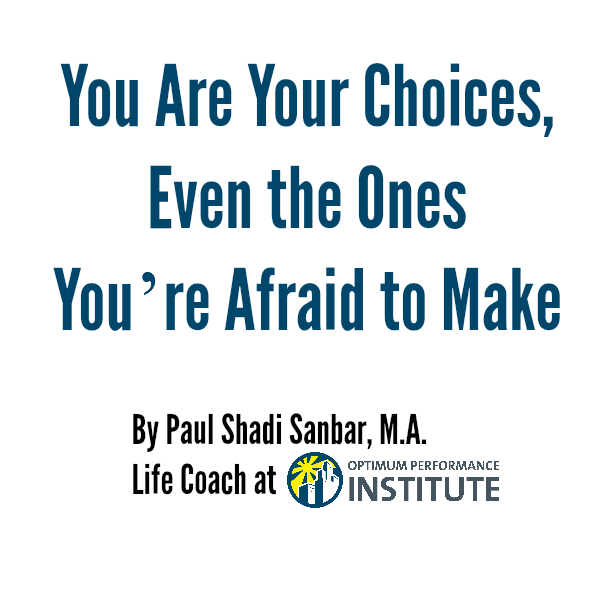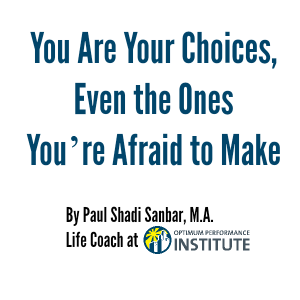
You Are Your Choices, Even the Ones You’re Afraid to Make
 As I attempt to expand on psychologist Barry Swartz’s work on the ‘Paradox of Choice,’ I am aware that you could spend the next three minutes online reading about any topic you could imagine. Entering those three words quoted above into a search box, I am met with 3.7 million results right at my fingertips; all potentially better or more interesting choices than mine. The mere notion that I am starting this blog about Optimum Performance Institute’s transitional program focused on Failure to Launch by sharing that you have 3.7 million other choices to click away has already spiked my anxiety. With each keystroke decision I make, I whisper under my breath, ‘This better be one great blog.’
As I attempt to expand on psychologist Barry Swartz’s work on the ‘Paradox of Choice,’ I am aware that you could spend the next three minutes online reading about any topic you could imagine. Entering those three words quoted above into a search box, I am met with 3.7 million results right at my fingertips; all potentially better or more interesting choices than mine. The mere notion that I am starting this blog about Optimum Performance Institute’s transitional program focused on Failure to Launch by sharing that you have 3.7 million other choices to click away has already spiked my anxiety. With each keystroke decision I make, I whisper under my breath, ‘This better be one great blog.’
This paradox of choice is especially true for young adults trying to wade through their parents’ and societies seemingly positive declarations of “You can be anything you want.” As they hear those echoes bouncing around their thoughts, it only serves to turn up volume on the question they are increasingly having to ask themselves: “What do I really want?” That initial declaration seems benign enough, but when a young adult, especially a bright and capable one born into a socio-economic class of even more choice has to actually choose from what feels like 3.7 million life paths. One wrong choice could feel like a chorus of boos. From that symphony of stress, failure to launch may become the song most often heard emanating from their ear buds.
For parents, emotionally present and now financially supportive well beyond their desires, this may not make much sense. They might be asking themselves, “Why is my child having such a difficult time launching into adulthood?”
Is this you? Have you laid in bed at night trying to figure out what went wrong? You loved them like the books told you to. You told them they could be anything they wanted. You gave them every opportunity to succeed and yet here they are, sitting lazily in your house, sinking further into your couch, seemingly frozen.
Swartz’s book and the accompanying analysis focused on young adults helps to put your conundrum into perspective. For these talented, but capricious young adults, the multitude of life and career paths they have to choose from, coupled with the burden to make the most of the wonderful opportunities afforded to them by their parents, the pressure to choose the right one is magnified. With so many options and so much awareness of everyone else’s choices, it is easy for them to become paralyzed by the enormousness of it all.
 In addition, too many choices leads to an escalation of expectations, expectations already exacerbated by the notion that they need to fill the sizable shoes endowed to them by their loving parents. The wonderment over every other choice not taken expands, and this buyer’s remorse promotes feelings of regret over missed opportunities. This regret intensifies worry and then worry feeds anxiety.
In addition, too many choices leads to an escalation of expectations, expectations already exacerbated by the notion that they need to fill the sizable shoes endowed to them by their loving parents. The wonderment over every other choice not taken expands, and this buyer’s remorse promotes feelings of regret over missed opportunities. This regret intensifies worry and then worry feeds anxiety.
For the young adult, this anxiety may become crippling, especially if they have already made some wrong choices, like the wrong college or major or worse. Now, standing at the precipice of a multitude of options and already feeling the weight over picking the ‘wrong’ one before, the decision to make the next ‘right’ choice looms even larger.
At this point, simply making these decisions, even the small ones, leads to self-blame. Self-blame, fueled by stagnation gives rise to depression, which intensifies the anxiety, and that inactivity turns into the paralyzed mass you love so much — just sitting there on your couch. Swartz postulates, if there are no other choices, it isn’t our fault. It’s the world’s fault for being set up that way, and there’s not much we can do to change it. But if there are many choices and things don’t work out the way we want them too, there is no one to blame but ourselves. For the young adult, still actualizing their core self, each indecision weighs like a text book in their backpack. Each wrong choice, even the daily ones, feels like a Fail on their life’s report card. Swartz concludes, this constant pressure to make the right choice is one of the contributing causes to high rates of depression, especially in the young adult population.
Suddenly, what once was a bounce in their step towards all that their life had to offer appears more like a trudge through a minefield of choice; each one more volatile than the next. As each decision is made, the shrapnel of outcomes not taken explodes in their face and the decision to no longer choose makes more and more sense. From this explanation, it is no longer a failure to launch, rather it’s a fear to launch born out of the paradox of choice.
Our adult minds know that it isn’t really about picking the perfect choice. Many young adults, confounded by the myriad choices we all have now, have yet to acquire this knowledge. You and I didn’t learn this until we failed a few thousand times ourselves. Only then did we realize that the only real failure is not choosing in the first place. These young people don’t feel that they have the time to make these same mistakes we made. Life, their friends, the world, are moving too fast around them.
And since you’re still reading this (Thank You), you must also be considering that you still need to make some choices for your paralyzed child. You have a choice to allow Optimum Performance Institute the opportunity to relieve some of their internal angst with our whole-person team approach to Failure to Launch.
We both know your child isn’t a failure. You have a garage half-full of boxes with awards, trophies, and school projects to prove it. What we have is an evidenced based approach to relieve that anxiety, depression and perfectionistic pressure causing their inability to fruitfully choose a rewarding career and life path. Go ahead, make the decision for them. It’s a choice that you can both be proud of and one that may lead to them calling you someday to thank you and to come move those boxes of mementos from your garage.
For more information on OPI residential programs and our measures to help reduce Failure to Launch obstacles for young adults, call us at (888) 814-5985 or click HERE to submit an online form. We’ll be in touch promptly.
